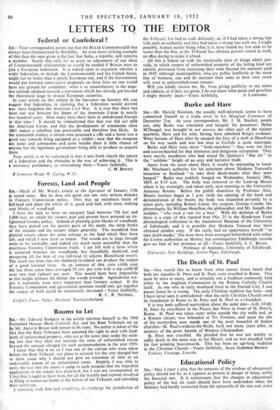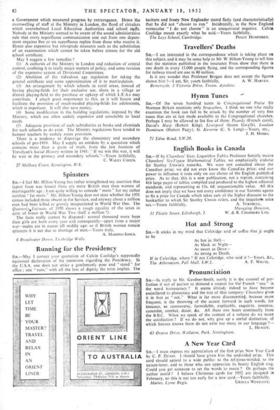Educational Policy
Snt,—May I eater a plea that the measure of the wisdom of educational policy should not be, as it appears at present in danger of being, solely the financial one. It is unfortunate that the changes in educational policy of the last six years should have been undertaken when the Ministry had hardly recovered from the upheavals of the war and under
a Government which measured progress by extravagance. Hence the overswelling of staff at the Ministry in London, the flood of circulars which overwhelmed Local Education Authorities and school stes. Nobody at the Ministry seemed to be aware of the sound administrative rule that every, superfluous communication sent out from one depart- ment requires five or six superfluous replies from those who receive it. Hence also expensive but retrograde measures such as the substitution of an examination which cannot be taken before sixteen for the old school certificate.
May I suggest a few remedies ?
(1) A catharsis of the Ministry in London and reduction of central control, confining it to really major matters of policy, and some revision of the expensive system of Divisional Committees.
• , (2) Abolition of the ridiculous age regulation for taking the general certificate and some approximation of it to matriculation.
(3) An arrangement by which schools in rural areas, instead of having playing-fields for their exclusive use, share in a village or district playing-field to the purchase or upkeep of which L.E.A.s may contribute. I attach great importance to this, as it will hasten and facilitate the provision of much-needed playing-fields for adolescents, which is important. It will also save money.
(4) Some modification in the building regulations, imposed by the Ministry, which are often unduly expensive and unsuitable to local needs.
(5) Adequate provision of such subsidiaries as books and chemicals for such schools as do exist. The Ministry regulations have tended to hamper teachers by unduly mean provision.
There is a tendency to disparage the elementary and secondary schools of pre-1939. May I supply an antidote by a quotation which contains more than a grain of truth, from the last footnote of Trevelyan's Social History written in 1941: " if we win this war, it will be won in the primary and secondary schools."—Yours faithfully, C. WALEY COHEN. 27 Melbury Court, Kensington, W.8.



































 Previous page
Previous page